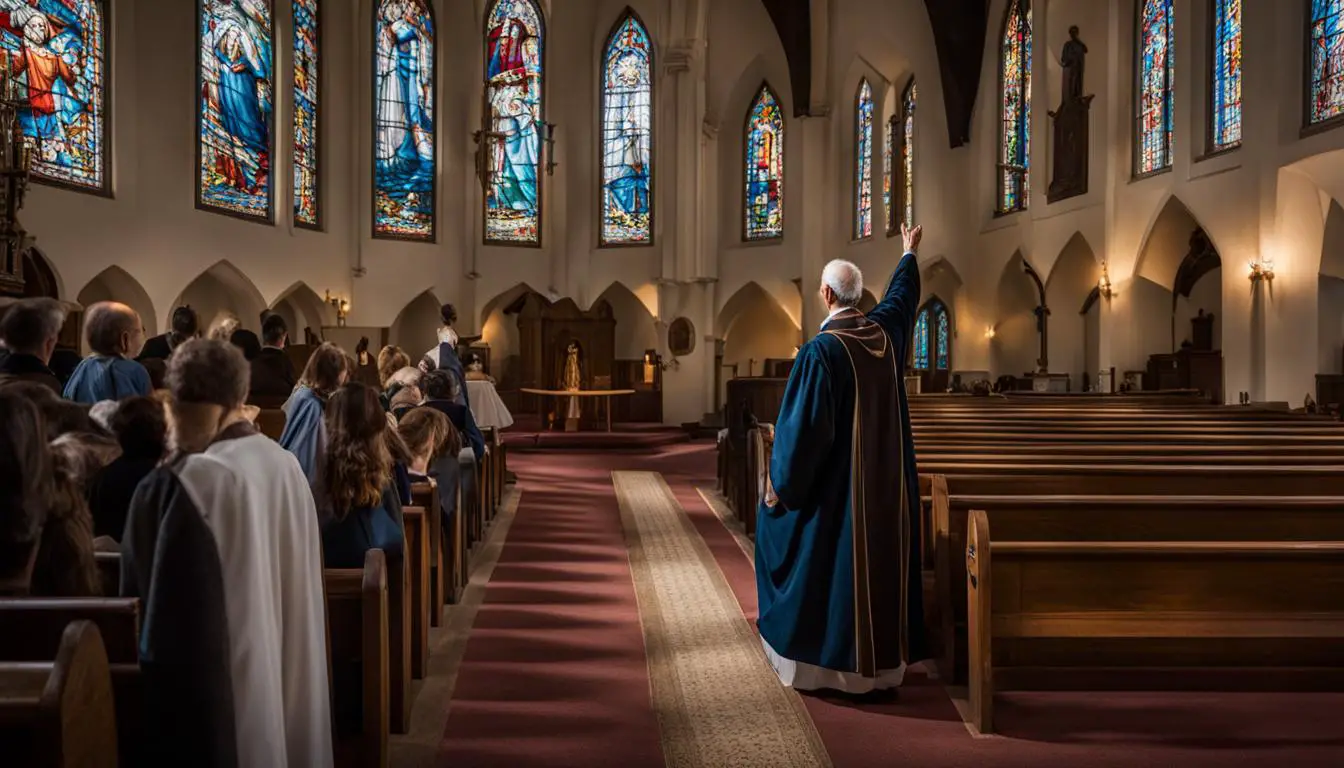Welcome to our in-depth guide on the Bible definition of a bishop. In this article, we will explore the origins, roles, and interpretations surrounding this important position in the church. From its etymology to its significance in various biblical contexts, we will examine the multifaceted nature of bishops in the Bible.
But first, let’s delve into the definition of a bishop according to the Bible. A bishop is a person who holds a position of authority and leadership within the church. The term “bishop” originates from the Greek word “episkopos,” which means overseer. The Bible portrays bishops as individuals entrusted with overseeing the church, teaching and preaching, and providing spiritual guidance to the congregation.
Key Takeaways:
- The Bible definition of bishop refers to a person in a position of authority and leadership within the church.
- The term “bishop” comes from the Greek word “episkopos,” which means overseer.
- Bishops are responsible for overseeing the church, teaching and preaching, and providing spiritual guidance.
- The role of bishops has evolved throughout history to meet the changing needs of the church.
- Scholars offer various perspectives on the role of bishops and their significance in biblical texts.
Etymology of the Term “Bishop”
The term “bishop” has a rich etymological history that can be traced back to various languages and civilizations. Understanding the origins of this word provides valuable insights into the historical and cultural contexts in which the role of a bishop emerged.
In Old English, the word “bishop” was derived from the Latin word “episcopus,” which itself originated from the Greek word “episkopos.” The Greek term carries the meaning of an overseer or supervisor, emphasizing the role of leadership and authority that a bishop holds within the church.
The concept of a bishop, as it is understood today, can be seen in both the Hebrew Bible and the Greek New Testament. Although the term “bishop” may not be explicitly mentioned in the Hebrew Bible, the Old Testament does make reference to leaders and overseers who fulfill similar roles within the community. In the New Testament, the term “bishop” is used to designate individuals who are responsible for the spiritual well-being of the early Christian church.
The Evolution of the Term “Bishop”
Over time, the role of a bishop has evolved to adapt to the changing needs and circumstances of the church. In the early centuries of Christianity, bishops played a crucial role in preserving and spreading the faith, often serving as mediators between the church and the secular authorities. They were responsible for the governance and administration of the church, as well as providing pastoral care to the community.
In today’s world, the term “bishop” can have different interpretations and meanings depending on the denomination and tradition within Christianity. Some view bishops as having a hierarchical and authoritative role, while others see them as spiritual leaders who guide the community through their teachings and example. The diversity of perspectives reflects the complex and multifaceted nature of the term “bishop” throughout history.
In conclusion, the etymology of the term “bishop” reveals its deep historical and linguistic roots. From its origins in Old English and Latin to its Greek roots in “episkopos,” the term has evolved over time to encompass a range of meanings and interpretations within the context of the Bible and the Christian church.
Bishops in the Hebrew Bible
Although the term “bishop” may not be explicitly mentioned in the Hebrew Bible, there are references to leaders and overseers in the Old Testament who fulfill similar roles. These leaders, often referred to as judges or rulers, provide guidance, administer justice, and lead the community in accordance with God’s laws. They embody the qualities of wisdom, righteousness, and devotion to the welfare of the people.
An example of a prominent figure with a bishop-like function in the Hebrew Bible is Moses. In Exodus 18:13-27, Moses appoints leaders and judges to help him in governing and guiding the people of Israel. These appointed leaders assist in resolving disputes, teaching the laws and commandments, and ensuring the well-being of the community. Their role as overseers reflects the essence of a bishop, overseeing the spiritual and practical requirements of the congregation.
| Old Testament | Bishops |
|---|---|
| Exodus 18:13-27 | Moses appoints leaders and judges to assist him in governing and guiding the people of Israel. |
| Deuteronomy 1:9-18 | Moses advises the people to select wise and understanding leaders, who will judge the people impartially. |
| Deuteronomy 16:18-20 | The appointment of judges is emphasized, with a focus on justice and impartiality. |
Through these examples, we can see that the role of leaders and overseers in the Hebrew Bible aligns with the concept of bishops. They bear the responsibility of providing guidance, upholding justice, and ensuring the spiritual well-being of the community, establishing a foundation for the role of bishops in the New Testament.
Bishops in the Greek New Testament

In the Greek New Testament, the role of bishops is prominently highlighted. Bishops, or “episkopoi” in Greek, are seen as leaders and overseers within the early Christian church. They are entrusted with the responsibility of guiding and shepherding the believers, ensuring their spiritual well-being and adherence to the teachings of Jesus Christ.
The Apostle Paul, in his letters to various churches, provides insights into the role and qualities of a bishop. In 1 Timothy 3:1-7, Paul outlines the qualifications for bishops, emphasizing the need for them to be above reproach, hospitable, and skilled in teaching. These requirements highlight the importance of moral integrity and the ability to effectively communicate and impart knowledge to the congregation.
“The saying is trustworthy: If anyone aspires to the office of overseer, he desires a noble task. Therefore an overseer must be above reproach, the husband of one wife, sober-minded, self-controlled, respectable, hospitable, able to teach, not a drunkard, not violent but gentle, not quarrelsome, not a lover of money.” – 1 Timothy 3:1-3
Beyond the qualifications, bishops are called to exercise their leadership role by teaching, preaching, and providing spiritual guidance. They serve as guardians of the faith, ensuring that the believers remain steadfast in their devotion and adherence to the Gospel.
| Scripture | Reference | Message |
|---|---|---|
| 1 Timothy 4:13 | “Until I come, devote yourself to the public reading of Scripture, to preaching and to teaching.” | Emphasizes the importance of teaching and preaching for bishops. |
| Titus 1:9 | “He must hold firm to the trustworthy word as taught, so that he may be able to give instruction in sound doctrine and also to rebuke those who contradict it.” | Highlights the responsibility of bishops to uphold sound doctrine and correct false teachings. |
| 1 Peter 5:2 | “Shepherd the flock of God that is among you, exercising oversight, not under compulsion, but willingly, as God would have you; not for shameful gain, but eagerly.” | Emphasizes the role of bishops as shepherds who care for and guide the congregation. |
Through their leadership, bishops play a vital role in nurturing and strengthening the early Christian community, ensuring the continuity and growth of the faith.
Bible Verses about Bishops
Throughout the Bible, there are several verses that mention or allude to the role of bishops. These scriptures provide insight into the qualifications, responsibilities, and importance of bishops in the church. Let’s explore some of these verses:
“This is a faithful saying: If a man desires the position of a bishop, he desires a good work. A bishop then must be blameless, the husband of one wife, temperate, sober-minded, of good behavior, hospitable, able to teach; not given to wine, not violent, not greedy for money, but gentle, not quarrelsome, not covetous; one who rules his own house well, having his children in submission with all reverence (for if a man does not know how to rule his own house, how will he take care of the church of God?);” – 1 Timothy 3:1-5
This verse emphasizes the qualities and character traits that a bishop should possess. They should be morally upright, able to teach, and demonstrate good leadership skills both within their family and the church.
“For a bishop must be blameless, as a steward of God, not self-willed, not quick-tempered, not given to wine, not violent, not greedy for money, but hospitable, a lover of what is good, sober-minded, just, holy, self-controlled, holding fast the faithful word as he has been taught, that he may be able, by sound doctrine, both to exhort and convict those who contradict.” – Titus 1:7-9
This scripture further emphasizes the importance of a bishop’s character and their ability to teach and defend the truth of the Gospel. They are called to exhort and convict those who go against sound doctrine.
“Therefore take heed to yourselves and to all the flock, among which the Holy Spirit has made you overseers, to shepherd the church of God which He purchased with His own blood.” – Acts 20:28
This verse highlights the role of bishops as overseers and shepherds of the church. They are entrusted with the responsibility of caring for and guiding the congregation, recognizing the value and significance of the church purchased by the blood of Jesus Christ.
| Verse | Description |
|---|---|
| 1 Timothy 3:1-5 | Outlines the qualifications and character traits of a bishop. |
| Titus 1:7-9 | Emphasizes the importance of a bishop’s character and teaching abilities. |
| Acts 20:28 | Highlights the role of a bishop as an overseer and shepherd of the church. |
These verses provide a glimpse into the biblical understanding of the role of bishops. They emphasize the need for bishops to exhibit moral integrity, teach sound doctrine, and care for the flock entrusted to them. By studying these scriptures, we can gain a deeper understanding of the significance and responsibilities associated with the position of a bishop.
Bishops in Historical Context

The history of bishops traces back to the early days of Christianity when the role and functions of bishops began to take shape. In the early centuries, bishops played a crucial role in preserving and spreading the faith, as well as maintaining the unity of the church. Their responsibilities included overseeing the administration of sacraments, resolving disputes, and ensuring the spiritual well-being of the congregation. As Christianity spread across different regions, the role of bishops evolved to adapt to the cultural and societal context of each location.
Over time, the structure and hierarchy of the church developed, with bishops assuming greater authority and responsibility. They became influential figures not only in religious matters but also in political and social affairs. Bishops played a significant role in shaping the governance and policies of the church, often working closely with kings and rulers. They became key figures in their respective communities, providing moral guidance, charitable support, and acting as mediators in times of conflict.
However, the historical context also saw instances of abuse of power and corruption among some bishops. The consolidation of authority and wealth led to conflicts and power struggles within the church. The Reformation in the 16th century challenged the authority of bishops and led to the establishment of various Protestant denominations that rejected the hierarchical structure of the Catholic Church.
“The historical context has shaped the role of bishops, with both positive and negative influences. While some bishops have been instrumental in driving positive change and leading their communities, others have been implicated in scandals and controversies.”
The Evolution of the Role of Bishops
Today, the role of bishops varies among different Christian denominations. In some traditions, bishops hold significant authority and are responsible for overseeing multiple churches within a region, while in others, the role of bishops is more symbolic or consultative. The interpretation and understanding of the role of bishops continue to evolve and vary within different theological and ecclesiastical perspectives.
Despite the different opinions and historical controversies surrounding bishops, their role remains integral to the functioning of many Christian denominations. Bishops continue to provide spiritual leadership, guide the faithful, and serve as a source of unity and stability within their respective churches. The history of bishops serves as a reminder of the complex and multifaceted nature of religious leadership throughout the ages.
Bishops in Historical Context Table
| Period | Key Developments |
|---|---|
| Early Christianity | Emergence of bishops as overseers of the church and key figures in preserving and spreading the faith. |
| Medieval Era | Increasing authority and wealth of bishops, involvement in political and social affairs, power struggles within the church. |
| Reformation | Challenges to the hierarchical structure of the Catholic Church, establishment of Protestant denominations with different views on bishops. |
| Modern Era | Diversity in the role of bishops across various Christian traditions, ranging from significant authority to more symbolic or consultative roles. |
Scholarly Perspectives on Bishops

When examining the role of bishops in the Bible, scholars offer diverse interpretations and perspectives. These viewpoints contribute to our understanding of the significance of bishops in biblical texts and their implications for the church today.
The Distinct Office of Bishops
Some biblical scholars argue for the distinct and separate position of bishops within the church. They emphasize the hierarchical structure and authority of bishops, viewing them as overseers and leaders who hold a unique role. According to this perspective, bishops have the responsibility to guide and shepherd the congregation, ensuring the spiritual well-being of the community.
A Fluid and Flexible Role
On the other hand, other scholars offer a more fluid and flexible interpretation of the role of bishops. They perceive the term “bishop” as encompassing a range of leadership positions within the church, rather than denoting a specific office held by a select few. This perspective highlights the idea that various individuals can fulfill the functions of a bishop, depending on the needs and dynamics of the community.
“The role of bishops should not be confined to a fixed position but should adapt to the changing circumstances and needs of the church.” – Dr. Sarah Thompson, Biblical Scholar
This perspective suggests that the role of a bishop is not limited to a singular definition but can be adapted and tailored to the specific context in which they serve. It underscores the importance of flexibility and adaptability in addressing the evolving needs of the church and its congregations.
Continued Discussion and Debate
The debate surrounding the role of bishops in the Bible continues among scholars, with ongoing discussions and differing opinions. While some emphasize the distinct office of bishops, others advocate for a more flexible interpretation, acknowledging the diversity of leadership roles within the church. This ongoing dialogue enriches our understanding of the historical context and contemporary implications of bishops, guiding the church in its interpretation and application of biblical teachings.
Bishops in Bible Stories
When exploring the Bible, one can find numerous stories that highlight the role of bishops in providing leadership and guidance. These narratives offer valuable insights into the significance of bishops within the biblical context.
One notable story featuring a bishop-like figure is the account of Timothy. In his letters to Timothy, the apostle Paul instructs him on how to fulfill his role as a bishop and shepherd the church in Ephesus. This story showcases the importance of bishops in ensuring the spiritual well-being of the congregation.
Another compelling example is the story of James, the brother of Jesus. James played a significant leadership role in the early Christian community, resembling the characteristics of a bishop. His guidance and authority helped shape and nurture the growing church.
These stories demonstrate how bishops have been depicted as influential figures within the Bible, responsible for leading and guiding the faithful. Their roles were crucial in maintaining the unity and spiritual development of the early Christian communities.
FAQ
What is the Bible definition of a bishop?
The Bible defines a bishop as a person in a position of authority and leadership within the church. They are responsible for overseeing the church, teaching and preaching, and providing spiritual guidance to the congregation.
Where does the term “bishop” come from?
The term “bishop” comes from the Greek word “episkopos,” which means overseer. It has its roots in the Old English word “bisceop,” derived from the Latin word “episcopus.”
Are there references to bishops in the Hebrew Bible?
While the term “bishop” may not be explicitly mentioned, there are references to leaders and overseers in the Old Testament who fulfill similar roles, such as Moses appointing leaders and judges to guide the people.
How are bishops mentioned in the Greek New Testament?
In the Greek New Testament, the term “bishop” is used to refer to leaders and overseers of the early Christian church. The Apostle Paul, in his letters, outlines the role of bishops as responsible for the spiritual well-being of the congregation.
What are some Bible verses about bishops?
Several verses mention or allude to the role of bishops, such as 1 Timothy 3:1-7, Titus 1:7-9, and Acts 20:28. These verses emphasize the importance of bishops in leading and shepherding the church.
How has the role of bishops evolved throughout history?
The role of bishops has evolved to reflect the changing needs and circumstances of the church. They played a crucial role in preserving and spreading the faith and assumed greater authority and responsibility as the church structure and hierarchy developed.
What do scholars say about the role of bishops?
Scholars have offered various interpretations and perspectives on the role of bishops. Some see it as a distinct position, while others view it as a more flexible role that can be fulfilled by different individuals within the church.
Are there any Bible stories that feature characters resembling bishops?
Yes, the stories of Timothy and James highlight characters who fulfill leadership roles in the early Christian community, resembling that of a bishop.







